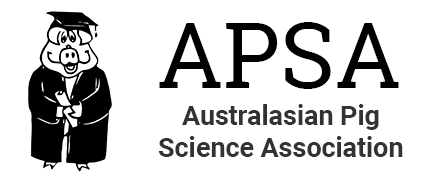APSA Conference Awards
International APSA Travel Scholarship Award
The purpose of the International APSA Travel Scholarship Award is to introduce outstanding early-career international pig scientists and their cutting-edge research to the Australasian pork industry. The Award will provide travel support to promising early-career scientists for presentation of their work at the APSA conference.
The aims of the International APSA Travel Scholarship Award are to:
- Support early career researchers to attend conferences;
- Enhance the researcher’s professional development; and
- Assist the researcher to develop a network with Australasian delegates in the area of pig science.
The scholarship consists of a certificate and AUD$3,500 to assist with travel costs to attend the biennial APSA conference. To be eligible for the International APSA Travel Scholarship Award, applicants must not reside in Australia and must satisfy at least one of the following:
- Be within 10 years of graduation (undergraduate level); or
- Be within 5 years of completing Masters/PhD studies; or
- Be a current post-graduate student.
IATS Award Application Guidelines
IATS Award Departmental Endorsement Template
APSA Medal
The APSA Medal encourages the development of our early-career scientist membership base by recognising the best presentation from a member presenting at their first APSA conference. The APSA Medal recognises excellence in science and the member’s ability to convey the scientific outcomes to the audience, with the winner presented with a medal and a cash prize of AUD$500.
To be eligible for the APSA Medal the applicant must be:
- An undergraduate, honours or postgraduate student;
OR
- A scientist with or without postgraduate qualifications but with less than 5 years’ experience;
AND
- Be delivering their first such presentation to an APSA conference and be a financial member of APSA.
Three full members of APSA are selected by the Committee to judge the APSA Medal, using the following weighted guidelines:
- Attributes of the speaker: Volume, speed, confidence.
- Audience contact: Eye contact, clarity of speech, timing to allow the audience to absorb important messages.
- Structure of talk: Opening, setting the scene by describing the content and purpose of the work, logical development with clear and frequent summaries of the preceding material, conclusion and summing up to relate to the opening.
- Use of slides: Effective use of “dead time” when audience is absorbed in the slide, smooth transition from text to slides and back, clear indication of the parts of the slide to which the speaker is referring, timing of slides and length of time that they are visible.
- Quality of slides: Clarity and size, effective use of colour and format, quantity of material to be absorbed. Did they complement the talk?
- Timing: One mark will be deducted for every 30 seconds over time.
- Questions: Clarity of answers, confidence in answering, ability to say “I don’t know” without losing face. Note: if you don’t keep to time during your talk you may miss out on gaining marks here.
APSA Flash Talk Award
The APSA Flash Talk Award recognises the most effective use of the three-minute Flash Talk in conveying a one-page paper to the audience. Flash Talk presenters may make use of one static slide to accompany the verbal presentation of the outcomes of their research. The challenge is to catch the attention of the audience and describe the work in a clear and concise manner. The APSA Flash Talk Award is open to anyone presenting a Flash Talk at APSA, with the winner presented with a trophy and a bottle of wine.
